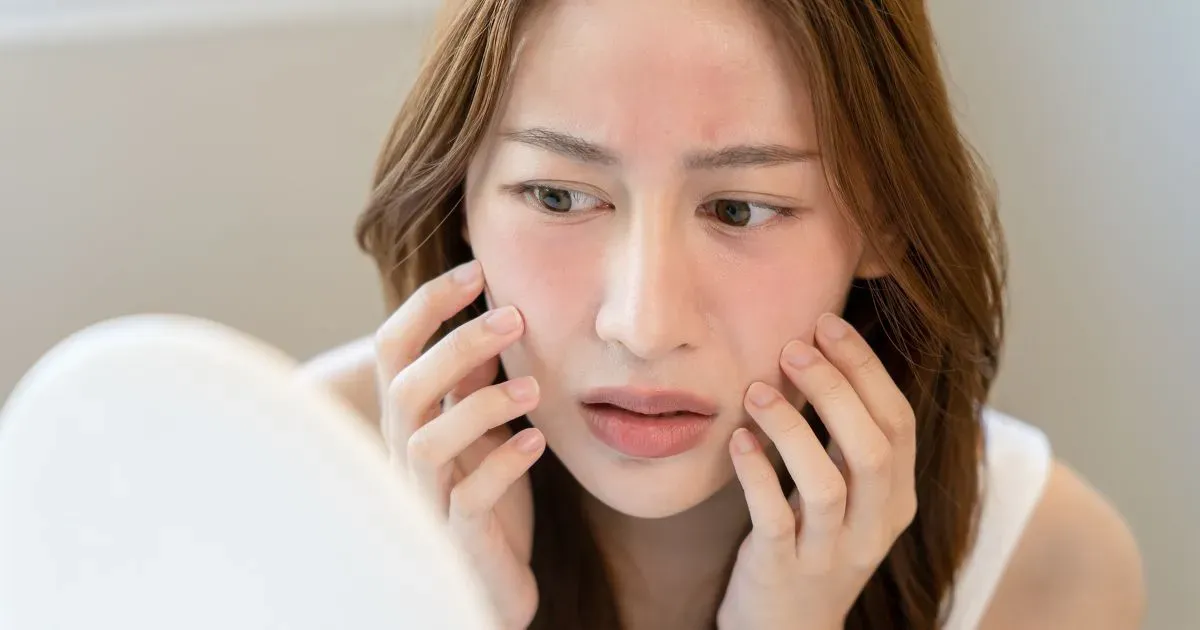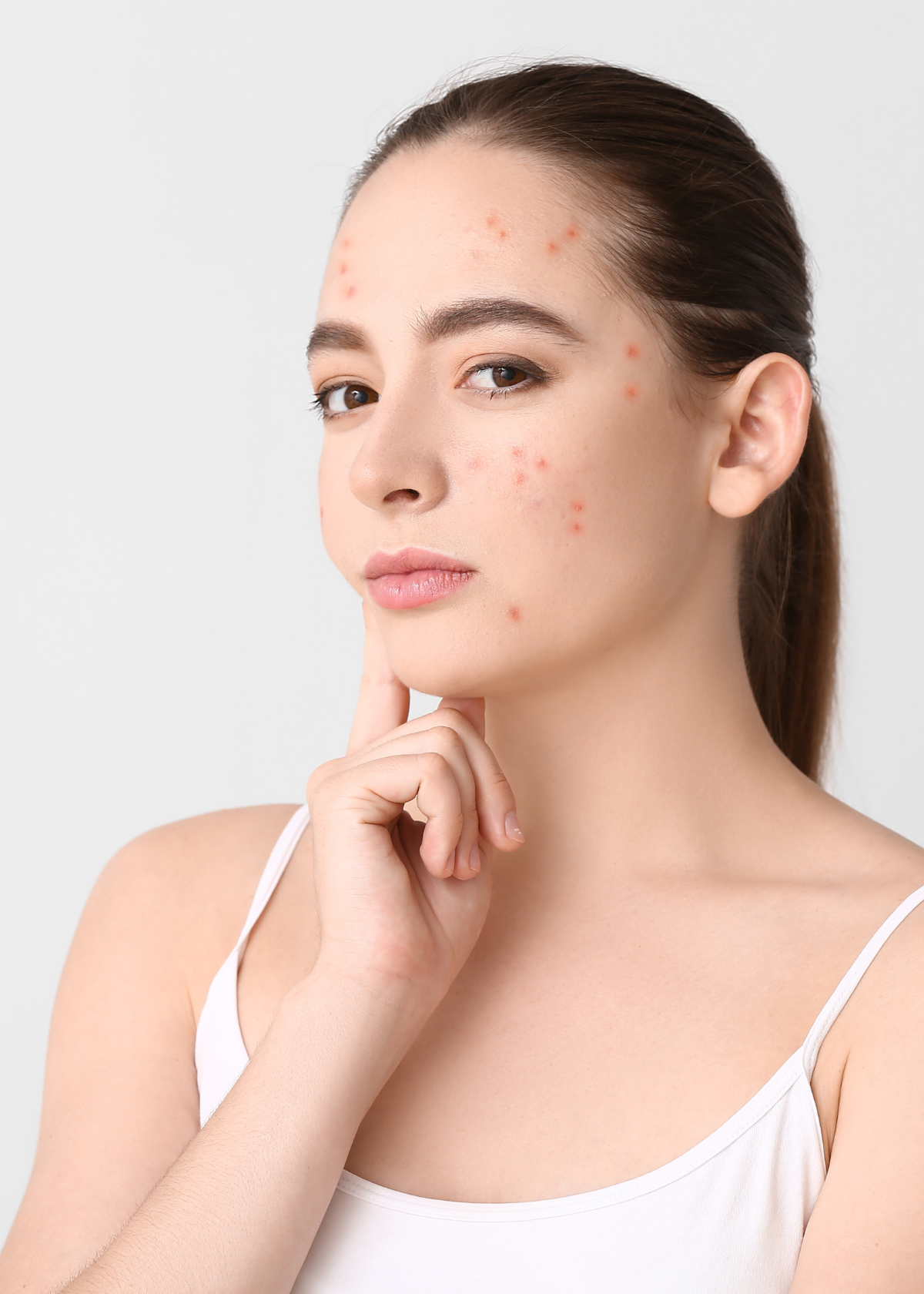If you've ever applied moisturizer to dry skin and felt a burning sensation, you're not alone.
The “ouch” factor could be especially confusing if you thought that moisturizers were meant to help soothe your dry skin in the first place. So what gives?
The answer lies in the ingredients of the moisturizer itself. Many moisturizers contain alcohol or fragrances that are too harsh for dry skin, resulting in a burning sensation when applied.
Even natural products can cause stinging because they often contain essential oils that can irritate delicate skin.
Moisturizer for Dry Skin - 7 Reasons Why It Stings

Here are 7 reasons why moisturizers sting dry skin and what you can do when your skin burns.
Not Enough Water
Skin is made up of 64% water, so if you aren’t drinking enough, your skin won’t be able to effectively absorb the moisture from your moisturizer.
The solution? Drink up. A minimum of 8 glasses of water a day should do the trick.
Using Harsh Products
If you use any cleansers or exfoliants that are too harsh for your skin type, they will strip away the natural oils from your face and leave it feeling tight and dry.
To avoid this, use gentle products that are specifically formulated for sensitive skin. We know that it can be difficult to find the perfect moisturizer for your dry skin.
So, we have done all the research and found the best moisturizer that you can use on your dry or sensitive skin without that sting feeling.

COSRX Snail Mucin Cream
Enriched with 92% snail secretion filtrate, this everyday multi-solution cream hydrates and plumps up skin while providing restorative benefits to soothe, nourish, and revive your skin’s radiance. Add it to your skincare routine.
Over-Exfoliating
While exfoliation removes dead skin cells, too much can cause more harm than good by further drying out your face and making it more susceptible to stinging sensations from moisturizers.
Try limiting exfoliation sessions to no more than once or twice a week, depending on how sensitive your skin is. Applying moisturizer with alpha hydroxy acids can also cause skin burns.
Choosing the Wrong Moisturizer
Everyone has different skincare needs, so make sure to find one that’s right for you. If your moisturizer burn, then it is most likely due to wrong choice.
If you have particularly dry skin or eczema-prone areas, look for something with ceramides and hyaluronic acid, as they help hold in moisture while also calming inflammation.
Applying Too Many Products
Don’t slather on the cream like there’s no tomorrow—a little goes a long way. Applying too many products on the outermost layer of your skin causes moisturizer burns.
Start with just a pea-size amount and build up if necessary; this helps prevent any potential irritation or stinging sensations before they start.
Skipping Sunscreen
Sunburns can be painful, but did you know that unprotected sun exposure can also leave your skin feeling tight and uncomfortable?
Always remember to apply SPF before heading outdoors. It will help you prevent moisturizer stings.
Ignoring Other Factors
Stress, poor diet, smoking—these things all affect our overall health (and our skin!), so make sure to check in with yourself regularly and adjust accordingly if needed; sometimes, all we need is an extra glass of water or keep skin hydrated, or an early bedtime and our skin immediately tells us “thank you!”
How To Avoid Stinging On Dry Skin?

The best way to avoid stinging is to opt for a product specifically designed for sensitive or dry skin.
These types of moisturizers usually omit common irritants such as fragrances and alcohol while supplying key ingredients like hyaluronic acid, glycerin, and ceramides—all helpful in promoting healthy skin hydration levels and locking in moisture.
Another way to prevent stinging is by using lukewarm water when applying the moisturizer.
Hot water can strip away natural oils from your face, which leaves it vulnerable to irritation from external elements such as lotions or creams.
Additionally, make sure you don't overdo it with the application amount; use just enough to cover your face with a thin layer of cream instead of slathering on too much at once to avoid further irritation.
Why Does Moisturizer Sting Dry Skin - FAQs
When you have dry skin, it's difficult to find a moisturizer that doesn't sting.
Most people with dry skin think that they just have to put up with the stinging sensation, but that's not true.
The right moisturizer can make a big difference in the way your skin feels. We've compiled a list of the most frequently asked questions about why moisturizers sting dry skin.
By understanding the causes of this stinging sensation, you'll be able to find the best solution for your needs.
Is it normal for dry skin to burn after moisturizer?
This can happen when the moisturizer is not compatible with your skin type. For example, if you have oily skin, using a moisturizer that is meant for dry skin will probably cause your skin to overproduce oil and lead to more breakouts.
It's important to find a moisturizer that is compatible with your skin type in order to avoid this burning sensation.
If you're not sure what type of skin you have, ask a dermatologist for advice. They will be able to recommend a specific moisturizer or line of products that are designed for your skin type.
Why does skin sting after lotion?
When skin is dry, the lack of hydration can cause the protective outer layer to become cracked. This opening in the skin allows irritants, such as lotion, to penetrate more easily and cause a stinging sensation.
In order to avoid oily skin irritation, it's important to use a moisturizer after bathing and before bed.
Look for a product that contains ingredients like petrolatum, glycerin, or dimethicone, which will help to seal in moisture and protect against environmental elements.
Can really dry skin burn?
It's not so much that dry skin can burn as it is that dry irritated skin makes you more susceptible to burns.
The outer layer of our skin, the epidermis, is responsible for protecting us from the environment. This layer is composed of several layers of cells, and the bottom-most layer is constantly being replaced by new cells that are pushed up from below.
When the skin is dry, this process slows down, and the top layer of cells becomes thicker and less flexible. This makes the skin burning more vulnerable to injuries and makes it harder for wounds to heal.
Why does it burn when I put moisturizer on my eczema?
The skin barrier is impaired in people with eczema, which means that moisturizers and other treatments can more easily penetrate the skin and cause irritation.
People with eczema also tend to have a higher sensitivity to irritants, so anything that comes into contact with their skin—including moisturizers—can cause a burning sensation.
In addition, some people may be allergic to the ingredients in moisturizers, which can also cause a allergic reaction leading to burning sensation. Ingredients that are commonly known to cause irritation or inflammation in people with eczema include fragrances, alcohol, and propylene glycol.
So, if you're finding that your moisturizer is burning your skin, try switching to a skincare product that doesn't contain any of those ingredients. And if you're not sure what ingredients are in a product, always check the label before using it.
Why is my moisturizer burning all of a sudden?
It's possible that you are using a moisturizer that is too strong for your skin type. There can be multiple reasons that your moisturizer gives a burning sensation to your skin. It can either be due to the alcohol in your moisturizer or compromised skin barrier.
If your skin is dry, you may need to use a more gentle moisturizer. If your skin is oily, you may need to use a light or oil-free moisturizer.
It's also possible that you are using a moisturizer that contains an ingredient that is irritating your skin. Some common irritants include fragrances, alcohol, and menthol.
If you think that an ingredient in your moisturizer is causing the burning sensation, you may want to try a different moisturizer to see if the problem goes away.
Conclusion
All in all, we know why moisturizer sting dry skin—it's likely because it contains irritating ingredients that are harsh on delicate facial skin.
Fortunately, there are plenty of ways to avoid it if you take some extra precautions when selecting and applying your skincare products. As a short-term remedy, you can use ice or frozen vegetables to apply to the burning area.
We suggest opting for products specifically designed for sensitive/dry skin and using lukewarm water whenever possible. That way, you can have beautiful glowing skin without any ouch factor involved.
If you have some other tips to prevent stinging sensation while using moisturizer, feel free to share them with all of us in the comments below.
References
- Mayo Clinic Staff. (2023, August 25). Dry skin - Symptoms and causes. Mayo Clinic.
- Rosacea.org. (2022, January 4). Study: Burning and Stinging Are Neglected but Important Symptoms in Managing Rosacea.
Read More About Moisturizers






